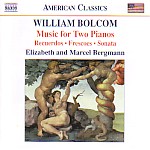William Bolcom’s two-piano oeuvre fully reveals his uncanny facility for assimilating the nuts and bolts of any musical style or genre that crosses his composing table. The three Recuerdos respectively filter Nazareth, Gottschalk, and the lesser-known Ramón Delgado Palacios through a modernist vantagepoint. For example, the Palacios homage begins with gothic C major chords in the manner of Bach/Busoni that slip into Palacios’ tuneful idiom, only for the two pianos to splinter off into more foreboding, dissonant territory. By contrast, Frescoes’ bold, bleak canvas purports to musically mirror the apocalyptic war descriptions from the Book of Revelation, the Aeneid, and Paradise Lost, as Bolcom wrings every ounce of textural and expressive variety from his unprecedented two pianos, harmonium, and harpsichord aggregation.
The 1993 Sonata for Two Pianos harks back to the tough, dissonant, and arguably academic style that typifies some of Bolcom’s “pre-ragtime” pieces, including the shorter 1963 Interlude recorded here. Lastly, the two-piano duo rag arrangements markedly flesh out Bolcom’s solo originals in terms of keyboard color and dynamic intensity. I’m not certain that Bolcom supervised or coached these recordings, but I can’t imagine he’d be less than ecstatic over the Bergmann duo’s caring, refined, and meticulously worked-out interpretations. While the excellent engineering conveys a realistic concert hall perspective, added amplitude and detail would have been welcome. For this reason I hope Nonesuch will reissue Bruce Mather and Pierrette LePage’s fiery, hard-hitting premiere recording of Frescoes, recorded in the early 1970s.
































